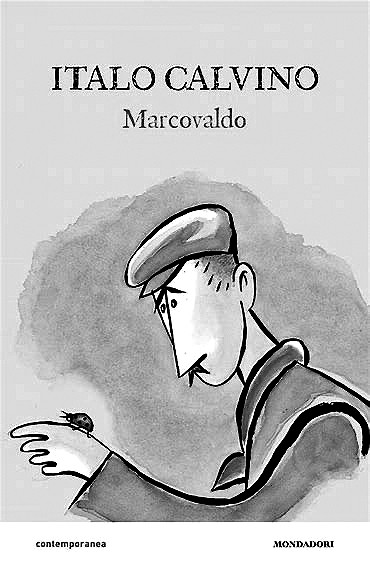Author: Wei Yi (Associate Professor, School of European Languages, Beijing Foreign Studies University, Director of the Confucius Institute at the University of Rome)
For modern people, more and more convenient electronic communication devices cannot fundamentally eliminate the gap between people, and sometimes even technically aggravate the barriers to communication. Today, with the improvement of material life, how to face loneliness seems to be one of the important issues for our survival. At this point, literature has already given us the answer.
obsessed with books
A waste paper packer who has never owned a family in his life, has been in the basement pile of waste paper for 35 years, doing the most menial job in the world. But he took this as an opportunity to enrich his life, which could have been extremely lonely, by reading myths, philosophy, literature and other works. This is the protagonist of Czech writer Bohumil Hrabar (1914-1997)’s novel Too Loud and Loneliness, and the author’s own life.
Bohumil Hrabar once volunteered to be a worker in a steel mill, and after recovering from a work-related injury, he went to a waste paper collection station to become a packer. Most of Hrabar’s characters are ordinary people who are unknown or even “thrown on the rubbish heap of society”. Through his own personal experience, the writer excavates the characteristics of these characters and the essence of their language, making them shining figures in the literary starry sky. They almost all have the same characteristic, which is the so-called “Barbiedale” behavior. It’s a way of life and a style that makes a heavy life easy.
Han Jia, the waste paper packer in the novel, even refers to this life as “My Love Story”, and regards the basement where he spends most of his life as a paradise, because it is completely his own world, and he and The surroundings melt into one, voraciously reading precious writings discarded as waste paper, as if ‘putting beautiful words in your mouth, sipping like candy, sips sips of spirits I sipped until the words dissolved in my body like alcohol.” His life had been rough: a basement with rats, old books that would never finish, and swarms of flies attacking him, and the only solace was the occasional beer. However, he humorously said, “The amount of beer I drink in thirty-five years can fill a fifty-meter swimming pool… My head with bald hair is Cinderella’s walnut.” Hanja even decided to retire After that, I bought a waste paper baler and put it in the garden to accompany him. He also said that his life has always been sad and lonely, but he also poured all his enthusiasm into it, and established connections with all kinds of characters, especially the distinctive and charming Cigan women, and some Cultural people, including the professor of aesthetics and the critic of the “Drama” who often come to him to buy books from the waste paper piles. The reason why Han Jia has such great charm is precisely because he is good at finding happiness in the life in front of him, and at the same time he is good at decorating his miserable days with humor.
Hangar’s obsession with books is reminiscent of the firefighter Guy Montag in the novel Fahrenheit 451 by American author Ray Bradbury (1920-2012). The story takes place in the early 1950s, when McCarthyism was rampant in the United States. The protagonist, Montag, is also a book-obsessed person. When he was carrying out the task of burning books, he took the books that were ordered to be destroyed and read them secretly when his colleagues were not paying attention. In fact, other firefighters will also be curious to “steal” one or two banned books, but they will destroy them within 24 hours to ensure the safety of the whole family. Montag was extremely bold. He had a considerable collection of classic books to read carefully, he also wanted to discuss his reading experience with his wife, and he wanted to quit this disgusting job. His wife, however, relies on TV and is not interested in books (exposing the threat of TV to people’s reading habits is also one of the reasons why the author wrote this book). In the end, the wife denounced the husband’s possession of the forbidden books, and the fire brigade prepared to destroy his home with a flamethrower. Fortunately, Montag escaped to the countryside, joined the fugitive Hongru, and continued to read the scriptures.
When books and knowledge are in danger, not only intellectuals and cultural people in the usual sense, but also ordinary people at the bottom of society will come forward. Perhaps because they lived a poor and lonely life, they developed an extraordinary obsession and obsession with books, and books also gave them a fulfilling life and the courage to live.
Lone Ranger in Literature
Italian writer Luigi Malerba (1927-2008) wrote in his short story “Spider-Man”: “During alone time, unique mechanisms may burst out of us. There is no loneliness, Einstein The theory of relativity would not have been proposed, and Leopardi would not have become a poet.” The protagonist of the novel works as a teller in a bank and spends his spare time at home. He himself likes to read comics the most, or imitate the heroic characters in the movies. For a while, he decided to imitate Spider-Man from the movie. One night, he tied nylon rope to a radiator, jumped out of the window, and tried to fly like Spider-Man. Although he was injured in an accident and had to temporarily give up the game of being a big hero, one day a boy recognized him and called him Spider-Man, which was nothing but affirmation and comfort for his adventure. This is his game against loneliness, and one of his many attempts.
The protagonist of Italo Calvino’s (1923-1985) collection of stories, Marco Valdo, is also alone. Marco Valdo was a farmer in southern Italy. In order to make a living, he moved his family north to Turin, a big city, and became a small porter in a large factory. Although he lives in a big city, neon lights, billboards and posters can’t attract his attention. On the contrary, a yellow leaf on a tree, a feather falling from a tile, and a mushroom burrowing out of the root soil will not escape. His eyes caused him to think about seasonal changes and future expectations. Although Marco Valdo is a figure living at the bottom of society, he is full of wild fantasies. In order to provide his family with healthy food, he would go fishing at the headwaters of rivers; for the health of his children, he would take them to the mountains to breathe fresh air; in order to have wood to warm his home, he would cut down billboards on the highway… …Although the results of many things were not as he wished, he galloped in the kingdom of his imagination, always maintaining an optimistic attitude and yearning for a better life, in order to overcome difficulties and loneliness, and make a very heavy life lighter a lot. This is the kind of lightness of literature that Calvino advocates in Chapter 1 of The Memorandum of Literature for the New Millennium, and it is also a lightness of attitude towards life.
“Marcovaldo” cover file picture
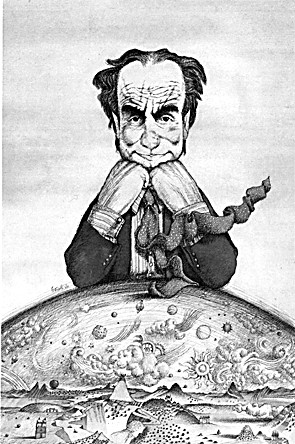
Calvino caricature profile picture
people who make noise
Many writers have said: loneliness is a kind of wealth. When talking about his famous work “The Solitude of Prime Numbers”, the famous Italian writer Paolo Giordano (1983-) said that loneliness is not a bad thing, nor is it always negative. Giordano locked himself in the basement of his house every day, only to come out after completing the writing plan for the day. Loneliness gave him a free and independent world, a world that belonged entirely to him and his characters. A person with a rich inner world is not afraid of being alone, because even if he is far away from the outer world, his inner world will be noisy on its own.
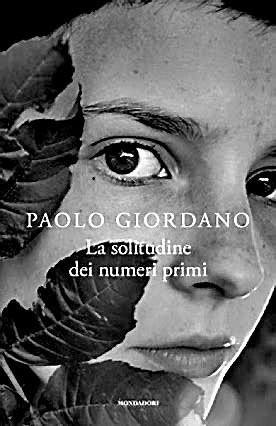
“The Solitude of Prime Numbers” cover file image
Giordano is a thoughtful writer, and his characters have always grown with him and his understanding of human society. His first novel “The Solitude of Prime Numbers” mainly describes the lonely life of the hero and heroine in their youth and youth, as well as the detachment between them. Those young soldiers in the second novel “The Human Body” are no longer there. Entangled in the sad thoughts of youth, but began to think about the relationship between people and their own bodies, and the destruction of human beings by war. In the third novel “Black and Silver”, the protagonist has grown into a mature man with his own family and children, and his thinking has become more and more mature, and uses the role of the nanny in the book to explore the proposition of life and death. The protagonists in each of Giordano’s works also seem to be “lone rangers” who can never be understood by others. Yet these characters are always trying to connect with others. This may be the process of the writer’s own ideological maturity. Rather than saying that they are lonely, it is better to say that they always examine life with their own eyes and analyze the society with independent thoughts.
The poet Dante is regarded as the father of Italian literature, and he was displaced for the rest of his life and could never return to his native country. However, instead of sinking into this apparent loneliness, he created a series of masterpieces. With the exception of “The Rebirth”, a collection of poems about his unrequited love, Beatrice, and his love for her, all of his important works were completed during his exile: “The Feast”, “On Common Sayings”, “On the Empire”, especially Jing Shihong wrote “The Divine Comedy”.
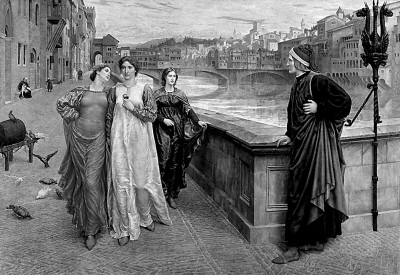
British painter Henry Holliday’s “Salute to Beatrice” file picture
In “The Divine Comedy”, Dante mentioned or insinuated his exile and its reasons many times in the form of prophecy, the most important of which appeared in “Paradise”. There Dante met his great-great-grandfather Cacciaguida. Dante first asks about the history of his family, and what it was like to see Florence in the old days, and then he asks Cachaguida about his future life, especially the exile that has been foreshadowed many times in an obscure way in hell and purgatory. Cachaguida explains the details of how Dante was forced to leave Florence and the fact that he would be forced to seek the support and protection of the various lords. He also said that Dante was going to part ways with the other exiles, and it was right to do so, because they would be defeated at the Battle of Lastella, and Dante would flee to Verona for refuge, where he would receive the noble family virtues. La Scala and Cangrande’s Asylum. At this point, Dante raises another question: if he is going to be forced into exile and has to rely on the help of these noble lords, is he going to risk offending them and tell what he has seen on his travels? ? Conversely, if he keeps silent about some things, and is worried that his reputation will be damaged, his works will not last forever. Cachaguida answered Dante clearly: You have to tell the reality of what you see, even if doing so makes some people unhappy. Dante’s warnings should, in Casacueda’s view, blow like a gust of wind to the top, and that would earn him honor; besides, and only in this way, could he imprint on the reader’s mind the educational significance of the long poem. in mind.
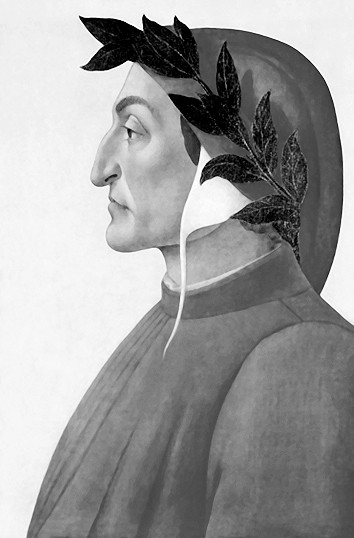
Botticelli’s painting of Dante
Even with the spiritual mentor Virgil (representing human reason and philosophy) in hell and purgatory, and the coveted lover Beatrice (representing divine grace) as guide in heaven, the company is only symbolic, but What Ding has undertaken is undoubtedly a lonely journey. Nevertheless, Dante used his extraordinary imagination and superhuman knowledge to create a world of uproar, and those stories made Dante’s “lonely” journey full of strength and meaning. The Divine Comedy is essentially the sum total of all the knowledge acquired by human beings in the Middle Ages.
Giacomo Leopardi (1798-1837) was a famous Italian poet, essayist, philosopher and linguist, and one of the main representatives of Italian romantic literature. To the same extent as Dante. Although he suffered throughout his life from the isolation of his hometown, the shackles of his family, and his physical weakness, Leopardi produced numerous masterpieces of poetry, philosophy and prose, the most famous of which include The idyllic poem “Infinite”, the love poem “To Sylvia”, the “To Italy” expressing patriotism, and the collections of essays “Moral Essays” and “Miscellaneous Essays” that reflect his philosophical thoughts, etc. Leopardi’s poetry added a patriotic and pessimistic style to Romanticism, and this unique style is closely related to the isolation and solitude he spent most of his life.
Leopardi was born into a declining aristocratic family in the very traditional and conservative region of Macerata in Italy. He began to study Latin, theology, philosophy and various classics in his childhood, and then began to write poetry and philosophical treatises, showing an amazing talent. In the seven years after the age of 14, he spent sleepless nights reading his father’s 16,000 volumes of books by himself. In particular, there are a few months between the ages of 16 and 17, which he describes as “learning without interruption and having clear expectations for the future”. This solitary and frantic way of learning produced a later learned and prolific poet, but it also seriously damaged his health. In 1817, under the influence of the letters of the classics scholar Pietro Giordano (1774-1848), he wrote “To Italy” full of patriotism. In the poem, he recalls Italy’s former glory, calling it “a lady of grace”, and then grieves for what she looks like now, “a few black lumps / a lot of blood flowing / and a lot of scars . . . If your eyes were two fresh springs/Crying will never wash away/The loss and humiliation you have suffered”. The poet asks why Italy has fallen so far, and then exclaims fervently: “O heaven, please let me / With my blood on the breasts of all Italians / To light a raging fire.” Only 20 years old. In the Italian national revival and reunification movement that was launched soon, his poem inspired countless Italians to fight for the drive away of foreign invaders and the realization of the free reunification of the motherland.
In 1819, Leopardi, desperate to escape the suffocating environment in his home town of Recanati, tried to run away from home, but was captured by his father and kept in custody and lost his freedom. The excruciating pain nearly blinded him. During this period, he created the handed down poem “Infinite”——
O lonely hill,
always so kind to me,
And the fence blocks my view,
I can’t see beyond the horizon.
I sit and watch, as if in infinite space,
Surrounded by an unearthly silence,
And a very deep stillness.
……
When I hear the wind rustle among the trees,
I compare this sound with infinite silence,
……
That’s it, my thoughts
immersed in infinite space,
In this sea of annihilation,
I also feel very sweet.
The scenery of his hometown was so quiet and so attached to him, it was also a fence blocking his vision. It is this extreme loneliness and pain, this geographical and cultural narrowness and man-made shackles, that inspire his reverie, so as to achieve a transcendental sublimation, blending into the infinite natural and cosmic space, making poetry and Philosophy blends in.
The great writers in the history of literature, with their extraordinary talents and “loneliness”, have created countless classic works for us, so that we can not be lonely when we are alone, but can ride the wings they built for us. , flying over the green mountains and the hustle and bustle of the world in the works.
“Guangming Daily” (October 06, 2022 Edition 06)
[
责编:田媛 ]
